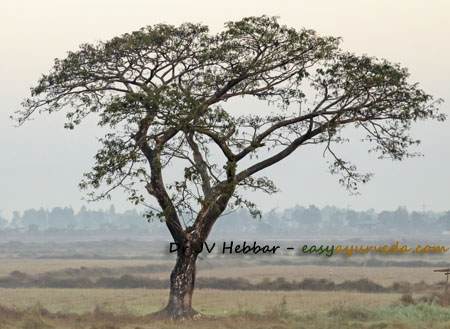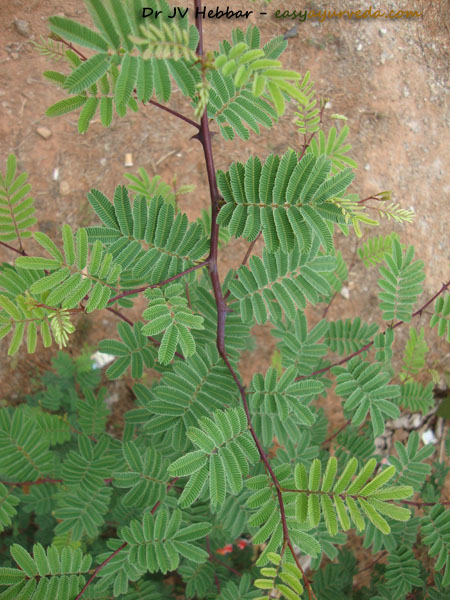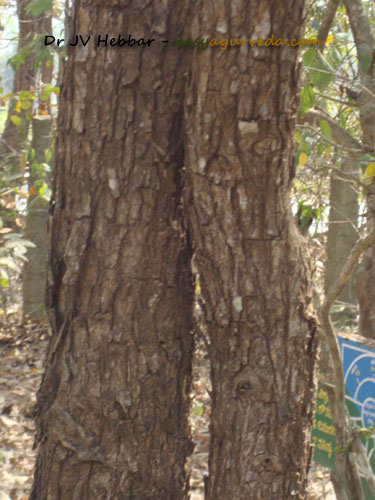Khadira – Acacia catechu Uses, Qualities, Remedies, Ayurveda Details
The Cutch tree is well known as the Kattha plant. The reason is kattha is used abundantly in pan shops as an additive of several pan varieties. The age-old tree Khadira is identified as Acacia catechu.
Khadira is a very famous skin benefiting Ayurveda herb. Its botanical name is Acacia catechu and it belongs to the Mimosoideae family (Simbi Kula). A famous Ayurveda skin tonic – Khadirarishta is prepared with this herb as the main ingredient.

Table of Contents
Vernacular names, Sanskrit synonyms
Hindi name – Khair
English name – Cutch tree
Telugu name – Chandra, Sandra
Tamil Name – Karanagalli
Kannada name – Kaggali
Sanskrit Synonyms:
Khadira – that which cures disease and brings stability to the body.
Raktasara – Extract of which is red in colour
Kantaki – having thorns
Bahusalya – It has thorns
Kushtaghna – Best kushtaghna dravya
Galaroganut – Useful in diseases of throat
Saradruma – Useful part is Heart wood
Dantadhavana – useful as toothbrush.
Yajniya – the wood of this tree is used in Yajna, Homa etc, spiritual practices as fuel.
Balapatra – having small sized leaves
Gayatri – Khadira is regarded as sacred
Classical categorization
Charaka – Kusthaghna, varga, Udarda prasamana, Mutrasangrahaniya varga
Susruta – Salasaradi varga
Bh. Pr. Ni – Vatadi varga
Varieties
Bh.Pri.Ni- Two varieties are mentioned
1. Khadira 2. Swetakhadira
Dh.Ni- Two types
1. Khadira 2. Somavalka
Ra.Ni- 3 types
1. Khadira
2. Śwetasära
3. Raktakhadira
Morphology
Habit- Moderate sized tree grows upto 40 ft. in height. Bark- Dark coloured, rough, young, shoots dark brown or purple, glabrous.
Leaves- Compound, Bi pinnate, 10-15 cm long, main rhachis, pubescent, with glands between many of the pairs of pinnae and a large conspicuous gland at or near the middle or the petiole, stipular spines short, hooked, Leaflets are 30-50 pairs, 0.5 cm wide, linear, subacute, sessile, often ciliate.
Inflorescence – 5-10 cm long axillary spikes.
Flowers- Pale yellow coloured, sessile with corolla longer than calyx.
Fruit-Pod, 5-7.5 cm long and 1-15 cm wide, flat, thin, brown, shining, with a triangular beak at the apex and narrowed at the base. Seeds are 3 to 10 in number.
Useful part
Sara – Heart wood
Aqueous extract becomes thin, porous blocks with a surface of yellowbrown or fawn colour.
Khadira for skin
Khadira is mainly used for the treatment of skin disorders. Its decoction, fermented liquids are used internally to treat a variety of skin disorders such as psoriasis, eczema, allergic hives, dermatitis etc.
Its oil, ointment, dusting powders etc are used for external application to treat skin conditions.
Apart from that, Khadira is hugely used in blood tissue disorders such as fever, bleeding disorders, etc.

Habitat
The tree is abundantly found in MP, Gujarat, Maharashtra, AP, TN and Karnataka, up to 1200 meters from sea level.
Its heart wood extract is called Khadira Sara. It is used as an ingredient in many medicines such as Lavangadi Vati.
Medicinal qualities
This medium sized tree is found in dry climates. The tree bark contains 35% catechu and 57% catechin. According to Ayurveda this is a drug of cold potency (Sheeta veerya) and balances Kapha and Pitta Dosha. The plant is appreciated for its potent blood purifying nature.
Guna (qualities) – Laghu (light to digest), Rooksha (dry)
Rasa (Taste) – Tikta (bitter), kashaya (astringent)
Vipaka (taste conversion after digestion) – Katu (pungent)
Veerya (potency) – Sheeta (cold)
Effect on Tridosha – Balances Kapha and Pitta.
Chemical constituents
10% of acacatechin, quercetin, gum quercitrin
Uses
Of all the herbs to treat skin diseases, Khadira is the greatest.
Of all the astringent herbs that are used as toothbrush, Khadira is the best.
Water decoction (Kashaya) of Khadira is instantly useful in diabetes and urinary tract disorders.
Primordial literature Charaka samhita explains it as a substance of choice for brushing the teeth!
Read related: Ayurvedic Way Of Teeth Brushing And Tongue Scraping
Another text Ashtanga sangraha explains this drug as best for the treatment of all kind of skin diseases including vitiligo/leucoderma.
Dantya – improves quality of teeth
Kandughna – relieves itching, pruritus
Kasaghna – Useful in cough, cold
Medoghna – Useful in obesity
Krumighna – Useful in worm infestation
Mehaghna – Useful in diabetes and urinary tract disorders
Jvaraghna – Useful in fever
Shvitraghna – Useful in leucoderma
Shothahara – relieves inflammation
Amahara – relieves Ama (a state of indigestion and malabsorption at digestive and cellular levels).
Pittasra hara – useful in bleeding disorders
Panduhara – useful in anemia, early stages of liver diseases
Kushtahara – Useful in skin diseases
In any skin disease, Khadira decoction should be used for bathing and drinking.
Part used, Dosage
Part used: Stem bark, heart wood, flowers
Dosage:
Powder – 1 – 3 grams per day, decoction – 30 – 100 ml per day
Heartwood extract – 500 mg to 1 g per day.
Home remedies
By Dr MS Krishnamurthy MD (Ayu), PhD.
Few important simple and effective remedies of acacia are as follows-
Mouth ulcers, skin diseases
1. Bark decoction for mouth ulcer and skin diseases:
Bark is collected from a mature tree during the early part of the rainy season. This is dried under sunshade.
A tablespoon of this is added with a cup of water, boiled and reduced to half a cup. Filtered. This is used for mouth gargling.
This is useful in stomatitis, gingivitis.
It is also administered orally, 30 ml, 2 times a day before food for the treatment of eczema, scabies, dermatosis etc
Ulcers, wounds
2. Dusting powder for ulcers and wounds:
Bark is dried and fine powder is made. This powder is used for dusting over wounds and ulcers. It heals the wounds faster.
Acne, blackheads
3. Khadira remedy for acne and black heads:
Khadira, Nimba and Daruharidra (Berberis aristata) are taken in equal quantities and paste is made with water.
It is applied externally to improve complexion, to relieve acne, comedones and black heads.
Blisters
4. Acacia remedy for blisters in young children/neonates:
Khadira and Raktachanadana(red sandal wood) are rubbed well against a stone and mixed. This paste is very effective in blisters appearing over young children and neonates.
Wounds
5. Khadira remedy for washing wounds:
Khadira-neem and Giloy – Tinsopora cordifolia are made into decoction and used to wash the chronic ulcers. This helps for early healing of wounds and chronic skin diseases.
Khadira is an age-old drug practiced for several centuries in India. It is a very good blood purifier and has the ability to prevent and cure several skin diseases which are challenging nowadays.
Regular intake of Khadira added water/hot infusion (Khadirodaka) is said to be a good dietary habit to prevent from Diabetes, skin diseases and obesity.
Interaction with medicines, supplements
Can this be used while taking Homeopathic medicine?
Yes. This product does not react with homeopathic medicine.
Can this medicine be continued while taking supplements like multivitamin tablets, Omega 3 fatty acids etc?
Yes. Generally, this product goes well with most dietary supplements. However, if you are taking more than one product per day, please consult your doctor for an opinion.
With western medicines
Seek your doctor’s advice if you are taking this product along with other western (allopathic / modern) medicines. Some Ayurvedic herbs can interact with modern medicine.
If both Ayurvedic and allopathic medicines are advised together, then it is best to take Allopathic medicine first, wait for 30 minutes and then take the Ayurvedic medicine.
Manufacture of catechu
The red heart wood obtained by felling the tree and separating the bark and sap wood, is cut into chips mechanically and put into extractors. The steam is passed through the drug for maximum extraction. The extract is concentrated under vacuum and is cooled by refrigeration. It is then centrifuged to isolate the cake of Katta. The cake is molded in desired sizes and dried in proper condition.
Chemical Tests
1. Catechu gives pink or red colour with Vanillin and Hydrochloric acid because of the presence of Catehin.
2. Lime water when added to aqueous extract of black catechu gives brown colour which turns to red precipitate on standing for some time.

Research
Researches have shown its effective anti inflammatory, immunomodulatory, antipyretic, antitussive and expectorant health benefits.
Ayurvedic medicines
Ayurvedic medicines with Khadira ingredient:
Khadiradi Gutika for cough
Khadirarishtam – useful in skin diseases
Khadiradi Vati – useful in teeth diseases, dental caries, etc
Dashamoolarishtam
Khadiradi kashaya – useful in infested wounds, intestinal worms, skin diseases.
Khadiravaleha, Irimedadi taila, Khadiradi kwatha, Musalikhadiradi kashaya, Nishakhadiradi kashaya, Khadirasthaka, etc are well known and effective formulations of Khadira plant.
Sthanika Karma (Systemic Action)
External Application – Styptic, good for skin disorders. Its powder can be used to sprinkle to arrest bleeding. External application is indicated in Teeth and gum related diseases. Gargling with its decoction is beneficial in hoarseness of voice and cough. Can be used in the case of Leukoderma.
Internal administration-
Digestive System – Being tikta (bitter) in taste acts as absorbent. Indicated in loss of taste, helminthiasis, diarrhea.
Circulatory System – Because of its bitter taste (tikta), it has styptic action, Beneficial in edema, and Anemia
Excretory System – Helps to reduce urine production, indicated in Diabetes.
Reproductive system – It reduces the quantity of semen, indicated in Pradara (Leucorrhea / Excess bleeding)
Satmikarana – Indicated in Obesity as it cause Medodhatu soshana (Scraping action on fat tissue)
Tvak (Skin) – Indicated in all types of skin diseases, itching etc
Tapakrama – Indicated in fever (Jirna jvara)
Pliha – Indicated in Splenomegaly











14 comments
Dr JV HebbarAuthor
Dear Ajay Agarwal, Please consult your doctor. You may require stronger medicines. Regards
Anil Sharma
Dear Dr., I am told that the foods that contain Catechins are good for reducing obesity. And Acacia catechu is supposed to contain a lot of the same. If so, please suggest some Ayurvedic Medicine which contain the extract of the same in good quantity. Thanks and regards,- Anil Sharma,CA, New Delhi.
Dr J V Hebbar MD(Ayu)
There are lot of medicines containing Khadira.
Maha Manjishtadi Kashayam – http://ayurmedinfo.com/2012/02/15/maha-manjishtadi-kashayam-benefits-dose-side-effects-ingredients-reference/
and
Ayaskriti – http://ayurmedinfo.com/2011/06/23/ayaskriti-uses-dose-side-effects-and-ingredients/
these are the two famous products, used for obesity, containing Khadira.
But please consult an Ayurveda doctor in person.
K VASUDEVAN
Dear Doctor Hebbar
I am a practitioner of Vedic Astrology, and I am interested in trying basic ayurvedic & herbal medicines together with astrological solutions. Do you have a list of herbs / trees / etc., that are associated with various CONSTELLATIONS such as Goose Berry for Bharani, Etti for Krithika, etc., IF possible I would like to know the exact TAMIL / SANSKRIT NAMES for the same. If you have any such table for instant reference, can you please spare.
K Vasudevan
You may send the details to
[email protected]
Dr Malini Bhat
Sir, We do not have any list as such.
Prabhakar
Dear doctor as khadiradi gutika contains camphor and areca nut ,is it safe to take this medicine ? Areca nut is carcinogenic and camphor is like poison to our body kindly reply
Dr J V Hebbar MD(Ayu)
As per Ayurveda, pach karpoora – is edible and areca nut in limited quantities is harmless.
Rajni
Is there any side effect of Khadira powder?
Dr J V Hebbar MD(Ayu)
Generally, it is very safe.
Ash
Sir on asking for khadira I have been given a dark brown crystalline powder.i think it’s a resin. Is it the right extract to be used as an ingredient in your bathing powder mix?
Sanjay warke
Which tree used for loose my weight , male or female tree ?
( of khairnar tree)
Dr J V Hebbar MD(Ayu)
I am not a botany expert. I only know that Acacia catechu is Khadira.
Natarajan K
Is acacia catechu resin or kasikatti {in Tamil} not useful?
Dr J V Hebbar MD(Ayu)
It is useful and has similar benefits.